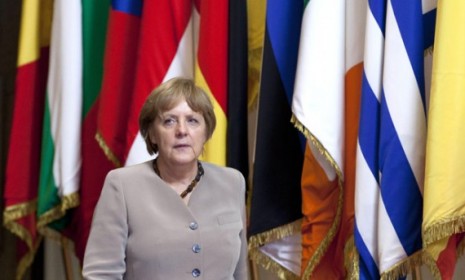The latest euro rescue plan: Crisis averted?
European leaders achieve a major breakthrough in tackling the continent's debt crisis, but as always, longterm concerns linger

A free daily email with the biggest news stories of the day – and the best features from TheWeek.com
You are now subscribed
Your newsletter sign-up was successful
Over the past two years, Europe has teetered on the brink of disaster more than once, and each time, leaders have intervened just in time to preserve the euro currency. Late last week, with borrowing costs for Spain and Italy skyrocketing to unaffordable levels, European leaders reached a "major breakthrough" in their attempts to finally resolve the crisis, adopting several far-reaching measures that have long been the subject of heated disagreement. The plan allows the European Union to use its 500 billion euro ($622 billion) bailout fund to directly recapitalize ailing banks in Spain and elsewhere, a move that is intended to prevent banking crises from adding to government debt loads. To appease Germany, which did not want to rescue other countries' banks, leaders also agreed to establish some sort of central regulatory authority that would oversee the continent's financial system, in what is seen as a step toward tighter continent-wide economic integration. Investors welcomed the news, and stock markets around the world soared. Is the latest rescue plan enough to save the euro?
No. Europe must do much more: For all the progress Europe just made, "the underlying problem with the single currency remains the same," says Britiain's The Telegraph in an editorial. The euro will never be stable until it is backed by a "full fiscal and political union" — in other words, a "United States of Europe," in which European nations share their debt load and form a central bank with teeth. Furthermore, European leaders have yet to address the "now crushing depression which has engulfed the eurozone's most troubled nations." Until these problems are dealt with, the continent will continue to lurch from one crisis to the next.
"Merkel's retreat will not solve Europe's problems"
The Week
Escape your echo chamber. Get the facts behind the news, plus analysis from multiple perspectives.

Sign up for The Week's Free Newsletters
From our morning news briefing to a weekly Good News Newsletter, get the best of The Week delivered directly to your inbox.
From our morning news briefing to a weekly Good News Newsletter, get the best of The Week delivered directly to your inbox.
But this is a step in the right direction: The new plan is nothing less than a "minor miracle," says Bloomberg in an editorial. It has the "potential to break the debilitating link between the troubles of banks and the solvency of governments," and has taken Europe a step "toward the kind of political union needed to make the euro area viable." Of course, European leaders will have to take several more steps to achieve true stability. But this is a very good start.
"Merkel's compromise could save the euro"
And critically, Germany has shown it's committed to the euro: "One political fact shone through" the latest rescue plan, says Britain's The Guardian in an editorial. When "faced with a binary choice of walking away from the monetary union and letting it collapse or doing something to hold it together," German Chancellor Angela Merkel made concessions that showed "she will stick with the euro." Euro rescue plans usually have a "short shelf life," but with Germany's new willingness to compromise, European leaders may have "stumbled across a longer-life formula."
"The euro: Rebuilding Rome in a day"
A free daily email with the biggest news stories of the day – and the best features from TheWeek.com
-
 Political cartoons for February 21
Political cartoons for February 21Cartoons Saturday’s political cartoons include consequences, secrets, and more
-
 Crisis in Cuba: a ‘golden opportunity’ for Washington?
Crisis in Cuba: a ‘golden opportunity’ for Washington?Talking Point The Trump administration is applying the pressure, and with Latin America swinging to the right, Havana is becoming more ‘politically isolated’
-
 5 thoroughly redacted cartoons about Pam Bondi protecting predators
5 thoroughly redacted cartoons about Pam Bondi protecting predatorsCartoons Artists take on the real victim, types of protection, and more